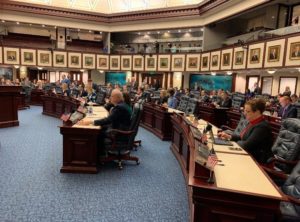Plus other legislative bills that passed

Final budget vote in the Florida House of Representatives, March 19, 2020. Courtesy, Florida House of Reps.
With the Florida Legislative session over, all that’s left is the Governor signing, vetoing, or allowing to die without his signature the 207 bills passed. They include 750 line items of local legislators’ projects totaling more than $400 million that are also open to veto. Lawmakers were constitutionally required to attend in person on March 19 in Tallahassee to vote on the final budget, but took precautions from the coronavirus.
So what we don’t know is how much of the budget will be trimmed to free-up added money that may be needed for coronavirus expenses or related economic recovery. The legislature approved $25 million plus another $20 million in federal pass-through money to help the state fight the virus. It also moved an additional $300 million into reserves. So Florida now has $3.8 billion in reserves which it could tap to help pay actual costs. However, with some businesses shut down across the state, tax revenues will take a hit, and the state could be short paying other costs that federal aid won’t pay for.
Governor DeSantis is waiting until late May or early June to determine where we are and the hole we need to fill. New York Governor Andrew Cuomo, as an example, said his hole as of now is between $10 billion to $15billion. So all eyes are wondering which budget items will suffer with vetoes. It’s also anticipated the Legislature will need to reconvene in one or more special sessions to deal with related budget shortfalls.
Our regular readers know which insurance and related bills passed and failed this session from our final Bill Watch from the last newsletter. Here’s a brief look at other bills of interest from past newsletters that passed and await the Governor’s action:
Expanded Nurse Practitioners and Pharmacists – HB 607 allows advanced registered nurse practitioners (ARNP) to provide primary care independent of physicians and allows certified nurse midwives to also work autonomously. The bill includes a $5 million loan repayment program for ARNPs who agree to work in primary-care shortage areas in Florida or community health centers. Another bill, HB 389, allows pharmacists to test and treat patients for the flu, strep throat, and chronic conditions. Both bills have already been signed into law by the Governor.
Environmental Accountability – HB 1091, a priority for the Governor, would increase illegal environmental discharge penalties by 50% and increase their length until the violations are resolved, with each day a separate offense. It adds teeth to enforcement efforts needed to prevent dumping sewage into waterways. It also expands on water quality measures within SB 712 that was also approved and addresses agricultural runoff and septic tanks. It shifts oversight of Florida’s 2.7 million septic tanks from the Department of Health to the Department of Environmental Protection. These bills are intended to help reduce blue-green algae blooms that have impacted both coasts over the past few years.
Sea-Level Rise – SB 178 represents Florida’s first tangible climate bill. It bars the use of tax dollars on any public construction project in a coastal zone until studies demonstrate it will be safe from flooding caused by rising sea levels.
Affordable Housing – HB 1339 allows local governments to approve affordable housing on any land zoned for residential, commercial, or industrial use. It also authorizes local governments to adopt an ordinance allowing accessory dwellings in areas zoned for single-family use, specifically for rent to extremely low-income, very low-income, low-income or moderate-income persons at an affordable rate.
LMA Newsletter of 3-30-20

